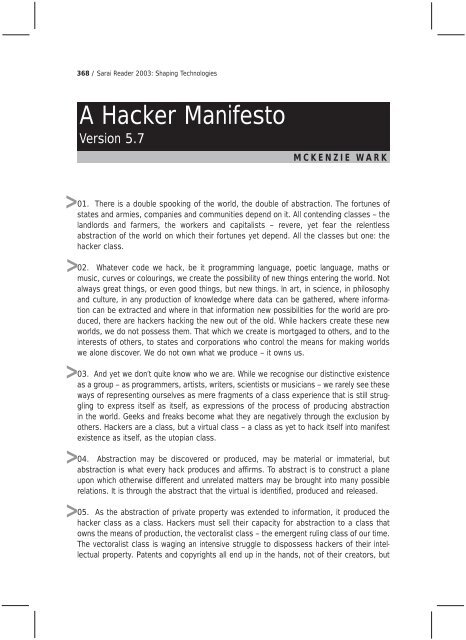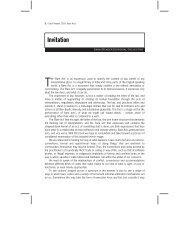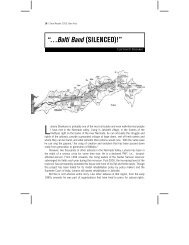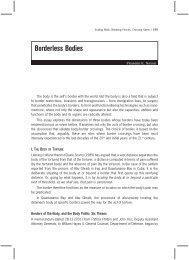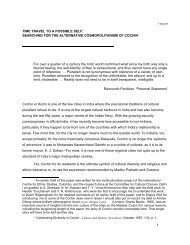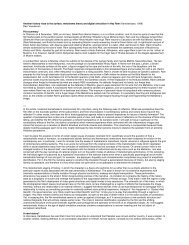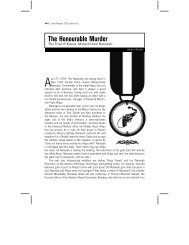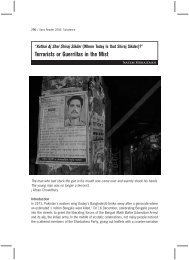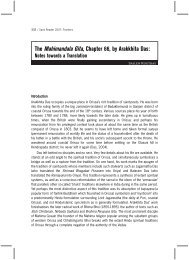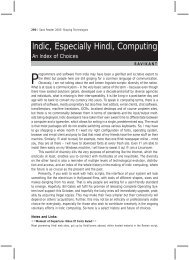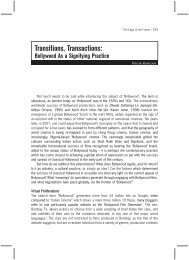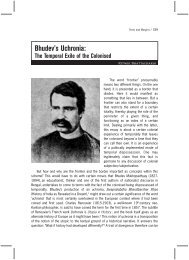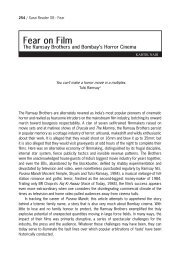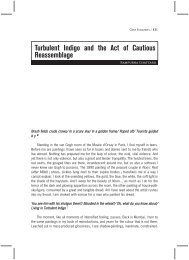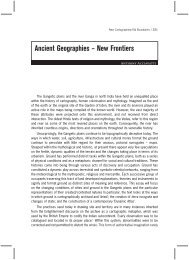A Hacker Manifesto - Sarai
A Hacker Manifesto - Sarai
A Hacker Manifesto - Sarai
Create successful ePaper yourself
Turn your PDF publications into a flip-book with our unique Google optimized e-Paper software.
><br />
><br />
><br />
><br />
368 / <strong>Sarai</strong> Reader 2003: Shaping Technologies<br />
A <strong>Hacker</strong> <strong>Manifesto</strong><br />
Version 5.7<br />
MCKENZIE WARK<br />
01. There is a double spooking of the world, the double of abstraction. The fortunes of<br />
states and armies, companies and communities depend on it. All contending classes – the<br />
landlords and farmers, the workers and capitalists – revere, yet fear the relentless<br />
abstraction of the world on which their fortunes yet depend. All the classes but one: the<br />
hacker class.<br />
02. Whatever code we hack, be it programming language, poetic language, maths or<br />
music, curves or colourings, we create the possibility of new things entering the world. Not<br />
always great things, or even good things, but new things. In art, in science, in philosophy<br />
and culture, in any production of knowledge where data can be gathered, where information<br />
can be extracted and where in that information new possibilities for the world are produced,<br />
there are hackers hacking the new out of the old. While hackers create these new<br />
worlds, we do not possess them. That which we create is mortgaged to others, and to the<br />
interests of others, to states and corporations who control the means for making worlds<br />
we alone discover. We do not own what we produce – it owns us.<br />
03. And yet we don’t quite know who we are. While we recognise our distinctive existence<br />
as a group – as programmers, artists, writers, scientists or musicians – we rarely see these<br />
ways of representing ourselves as mere fragments of a class experience that is still struggling<br />
to express itself as itself, as expressions of the process of producing abstraction<br />
in the world. Geeks and freaks become what they are negatively through the exclusion by<br />
others. <strong>Hacker</strong>s are a class, but a virtual class – a class as yet to hack itself into manifest<br />
existence as itself, as the utopian class.<br />
04. Abstraction may be discovered or produced, may be material or immaterial, but<br />
abstraction is what every hack produces and affirms. To abstract is to construct a plane<br />
upon which otherwise different and unrelated matters may be brought into many possible<br />
relations. It is through the abstract that the virtual is identified, produced and released.<br />
05. As the abstraction of private property was extended to information, it produced the<br />
hacker class as a class. <strong>Hacker</strong>s must sell their capacity for abstraction to a class that<br />
owns the means of production, the vectoralist class – the emergent ruling class of our time.<br />
The vectoralist class is waging an intensive struggle to dispossess hackers of their intellectual<br />
property. Patents and copyrights all end up in the hands, not of their creators, but
><br />
><br />
><br />
Alt + Option / 369<br />
in those of the vectoralist class that owns the means of realising the value of these abstractions.<br />
The vectoralist class struggles to monopolies abstraction. <strong>Hacker</strong>s find themselves<br />
dispossessed both individually and as a class.<br />
06. Production produces all things, and all producers of things. Production produces not<br />
only the object of the production process, but also the producer as subject. Hacking is the<br />
production of production. The hack produces a production of a new kind, which has as its<br />
result a singular and unique product and a singular, unique producer. Every hacker is at one<br />
and the same time producer and product of the hack and emerges in its singularity as the<br />
memory of the hack as process.<br />
07. The hack produces both a useful and a useless surplus, although the usefulness of any<br />
surplus is socially and historically determined. The useful surplus goes into expanding the<br />
realm of freedom wrested from necessity. The useless surplus is the surplus of freedom<br />
itself, the margin of free production unconstrained by production for necessity.<br />
08. The production of a surplus creates the possibility of the expansion of freedom from<br />
necessity. But in class society, the production of a surplus also creates new necessities.<br />
Class domination takes the form of the capture of the productive potential of society and<br />
its harnessing to the production, not of liberty, but of class domination itself. The ruling<br />
class subordinates the hack to the maintenance of forms of production that maintain class<br />
power, and the suppression or marginalisation of other forms of hacking.<br />
09. The class struggle, in its endless setbacks, reversals and compromises returns again<br />
and again to the unanswered question – property – and the contending classes return again
><br />
><br />
><br />
370 / <strong>Sarai</strong> Reader 2003: Shaping Technologies<br />
and again with new answers. The working class questioned the necessity of private property<br />
and the communist party arose, claiming to answer the desires of the working class.<br />
The answer, expressed in the Communist <strong>Manifesto</strong> was to “centralise all instruments of<br />
production in the hands of the state”. But making the state the monopolist of property has<br />
only produced a new ruling class, and a new and more brutal class struggle. But perhaps<br />
this was not the final answer, and the course of the class struggle is not yet over. Perhaps<br />
there is another class that can pose the property question in a new way – and offer new<br />
answers to breaking the monopoly of the ruling classes on property.<br />
10. Information, like land or capital, becomes a form of property monopolised by a ruling<br />
class, in this case a class of vectoralists, so named because they control the vectors along<br />
which information is abstracted, just as capitalists control the material means with which<br />
goods are produced and pastoralists the land with which food is produced. Information circulated<br />
within working class culture as social property belonging to all. But when information<br />
in turn becomes a form of private property, workers are dispossessed of it and must<br />
buy their own culture back from its owners, the vectoralist class. The whole of time, time<br />
itself, becomes a commodified experience.<br />
11. Vectoralists try to break capital’s monopoly on the production process, and subordinate<br />
the production of goods to the circulation of information. The leading corporations<br />
divest themselves of their productive capacity, as this is no longer a source of power. Their<br />
power lies in monopolising intellectual property – patents and brands – and the means of<br />
reproducing their value – the vectors of communication. The privatisation of information<br />
becomes the dominant, rather than a subsidiary, aspect of commodified life. As private<br />
property advances from land to capital to information, property itself becomes more<br />
abstract. Just as capital as property frees land from its spatial fixity, information as property<br />
frees capital from its fixity in a particular object.<br />
12. The hacker class, producer of new abstractions, becomes more important to each<br />
successive ruling class, as each depends more and more on information as a resource. The<br />
hacker class is the class with the capacity to create not only new kinds of object and subject<br />
in the world and new forms of property in which they may be represented, but new<br />
kinds of relations beyond the property form.<br />
13. Property constitutes an abstract plane upon which all things may be things with one<br />
quality in common, the quality of property. Land is the primary form of property. Pastoralists<br />
acquire land as private property through the forced dispossession of peasants who<br />
once shared a portion of it in a form of public ownership. Capital is the secondary form of<br />
property, the privatisation of productive assets in the form of tools, machines and working<br />
materials. Capital, unlike land, is not in fixed supply or disposition. It can be made and<br />
remade, moved, aggregated and dispersed. An infinitely greater degree of potential can be<br />
released from the world as a productive resource once the abstract plane of property<br />
includes both land and capital. But the abstraction of commodity production does not end
><br />
><br />
><br />
><br />
Alt + Option / 371<br />
with capitalism. The transformation of information into an even more abstract form of property,<br />
abstracted even from its material expression, takes commodification into a third, as<br />
yet uncharted phase of development.<br />
14. <strong>Hacker</strong>s must calculate their interests not as owners, but as producers, for this is what<br />
distinguishes them from the vectoralist class. <strong>Hacker</strong>s do not merely own, and profit by<br />
owning, information. They produce new information, and as producers need access to it<br />
free from the absolute domination of the commodity form. Hacking as a pure, free experimental<br />
activity must be free from any constraint that is not self-imposed. Only out of its<br />
liberty will it produce the means of producing a surplus of liberty and liberty as a surplus.<br />
15. Private property arose in opposition not only to feudal property, but also to traditional<br />
forms of the gift economy, which were a fetter to the increased productivity of the commodity<br />
economy. The gift becomes a marginal form of property, everywhere invaded by the<br />
commodity, and turned towards mere consumption. As vectoral production develops, the<br />
means appear for the renewal of the gift economy. Everywhere that the vector reaches, it<br />
brings into the orbit of the commodity. But everywhere the vector reaches, it also brings<br />
with it the possibility of the gift relation.<br />
16. The hacker class has a close affinity with the gift economy. The hacker struggles to<br />
produce a subjectivity that is qualitative and singular, in part through the act of the hack<br />
itself. The gift, as a qualitative exchange between singular parties, allows each party to be<br />
recognised as a singular producer, as a subject of production, rather than as a commodified<br />
and quantified object. The gift expresses in a social and collective way the subjectivity<br />
of the production of production, whereas commodified property represents the producer as<br />
an object, a quantifiable commodity like any other, of relative value only. The gift of information<br />
need not give rise to conflict over information as property, for information need not<br />
suffer the artifice of scarcity once freed from commodification.<br />
17. The vectoralist class contributed, unwittingly, to the development of the vectoral space<br />
within which the gift as property could return, but quickly recognised its error. As the vectoral<br />
economy develops, less and less of it takes the form of a social space of open and<br />
free gift exchange, and more and more of it takes the form of commodified production for<br />
private sale. The vectoralist class can grudgingly accommodate some margin of socialised<br />
information, as the price it pays in a democracy for the furtherance of its main interests.<br />
But the vectoralist class quite rightly sees in the gift a challenge not just to its profits but<br />
to its very existence. The gift economy is the virtual proof for the parasitic and superfluous<br />
nature of vectoralists as a class.<br />
18. The vectoral class struggles at every turn to maintain its subjective power over the<br />
vector, but as it continues to profit by the proliferation of the vector, some capacity over it<br />
always escapes control. In order to market and profit by the information it peddles over the<br />
vector, it must in some degree address the vast majority of the producing classes as sub-
372 / <strong>Sarai</strong> Reader 2003: Shaping Technologies<br />
jects, rather than as objects of commodification. The hacker class seeks the liberation of<br />
the vector from the reign of the commodity, but not to set it indiscriminately free. Rather to<br />
subject it to collective and democratic development. The hacker class can release the<br />
virtuality of the vector only in principle. It is up to an alliance of all the productive classes<br />
to turn that potential to actuality, to organise themselves subjectively, and use the available<br />
vectors for a collective and subjective becoming.<br />
19. Progress is possible, plagiarism implies it.


